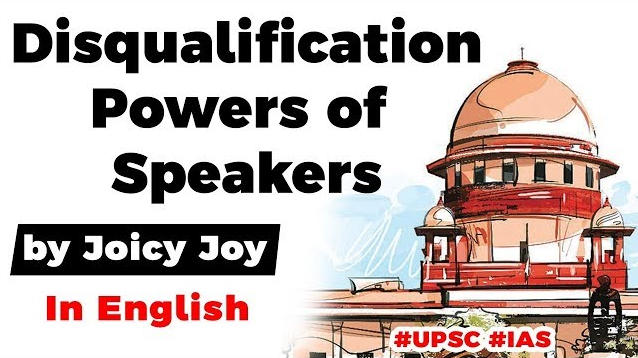Table of Contents
CURRENT AFFAIR
- The Supreme Court has recently held that disqualification petitions under the tenth schedule should be adjudicated by a mechanism outside Parliament or Legislative
SC OBSERVATIONS
- The Court has suggested a permanent tribunal headed by a retired Supreme Court judge or a former High Court Chief Justice as a new mechanism.
- This would require an amendment to the Constitution.
- However, for the present, the court said the Speakers should decide Tenth Schedule disqualifications within a “reasonable period”. What is „reasonable‟ would depend on the facts of each case.
- The Court held that unless there are “exceptional circumstances”, disqualification petitions under the Tenth Schedule should be decided by Speakers within three months.
LOGIC
- The Supreme Court questioned why a Speaker, who is a member of a particular political party and an insider in the House, should be the “sole and final arbiter” in the disqualification of a political defector.
- For that matter, it asked why disqualification proceedings under the Tenth Schedule should be kept in-house and not be given to an “outside” authority.
- It reasoned that even the final authority for removal of a judge is outside the judiciary and in Parliament.
- The Court held that only swift and impartial disqualification of defectors would give “real teeth” to the Tenth Schedule.
WHAT IS THE ANTI-DEFECTION LAW?
- Aaya Ram Gaya Ram was a phrase that became popular in Indian politics after a Haryana MLA Gaya Lal changed his party thrice within the same day in 1967.
- The anti-defection law sought to prevent such political defections which may be due to reward of office or other similar considerations.
- The Tenth Schedule was inserted in the Constitution in 1985.
- It lays down the process by which legislators may be disqualified on grounds of defection by the Presiding Officer of a legislature based on a petition by any other member of the House.
- A legislator is deemed to have defected if he either voluntarily gives up the membership of his party or disobeys the directives of the party leadership on a vote.
DISQUALIFICATION UNDER THE TENTH SCHEDULE
- The Anti-Defection Law was passed in 1985 through the 52nd amendment to the
- It added the Tenth Schedule to the Indian
- The main intent of the law was to combat “the evil of political defections”.
PROVISIONS
- a member of a House belonging to any political party becomes disqualified for being a member of the House, if he voluntarily gives up his membership of such political party; or he votes or abstains from voting in such House contrary to any direction issued by his political party without obtaining prior permission of such party and such act has not been condoned by the party within 15 days.
EXCEPTIONS
- If a member goes out of his party as a result of a merger of the party with another party. A merger takes place when two-thirds of the members of the party have agreed to such
- If a member, after being elected as the presiding officer of the House, voluntarily gives up the membership of his party or rejoins it after he ceases to hold that office. This exemption has been provided in view of the dignity and impartiality of the office.
POWERS OF SPEAKER WITH REGARD TO ANTI-DEFECTION LAW
- Any question regarding disqualification arising out of defection is to be decided by the presiding officer of the House.
- Supreme Court has declared that the decision of the presiding officer is not final and can be questioned in any court.
- It is subject to judicial review on the grounds of malafide, perversity, etc.
DOES THE ANTI-DEFECTION LAW AFFECT THE ABILITY OF LEGISLATORS TO MAKE DECISIONS?
- The anti-defection law seeks to provide a stable government by ensuring the legislators do not switch sides.
- However, this law also restricts a legislator from voting in line with his conscience, judgement and interests of his electorate.
- Such a situation impedes the oversight function of the legislature over the government, by ensuring that members vote based on the decisions taken by the party leadership, and not what their constituents would like them to vote for.
Latest Burning Issues | Free PDF






















 WhatsApp
WhatsApp